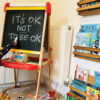by Chloe Webster
Pebbles childcare
As a society, we are becoming significantly more aware of issues, troubles and confusion around the subject of gender for children and within the Early Years Sector. Here we take a look at how we as practitioners and parents can support children in exploring their feelings towards their gender and to ensure that we are not promoting or advocating gender stereotypes within our settings and home routines and environment, thus allowing children the freedom and confidence to be happy and resilient individuals.
BBC 2 aired a fascinating documentary entitled No more boys and girls: can our kids go gender free? piloting an experiment within a school whereby all items/language/practices that could promote traditional gender stereotypes were removed and discussed
and the children were encouraged to be ‘gender free’ with no reference or distinction being made to them as ‘boys’ and ‘girls.’
As society becomes more aware of gender stereotyping and issues; with schools now introducing same-sex toilets, banning skirts and gender typical uniform, and commuter announcements being changed to include and promote equality for the binary community (genderless), this documentary bought these issues to our attention and as a result made us reflect upon our own practice and provision in order to identify whether or not we are indirectly promoting gender stereo-typical play for our children.
As both practitioners and parents we can all be guilty of gender stereotyping children indirectly in even the most discreet of ways, which inadvertently contribute to the overbearing stereotypes that society has now imposed on our children.
As Ros Ball and James Miller investigate in their book The gender agenda: a first-hand account of how girls and boys are treated differently, so many people make the assumption and distinction that there are specific toys designated for boys and girls.
Take this extract from the book where the authors write about a play date with a friend and their child: “11th March 2011 – Yesterday a friend came to play with her three year old boy and a one year old girl. I asked what toys they would like me to get out. I suggested DUPLO, musical instruments, cars or dressing up. My friend was sure her boy would want to play with the cars. He didn’t seem more interested in them than any other toys to me. Later she asked her girl, ‘Wouldn’t you like to try on the fairy wings?’ She said no. I often see blatant directing of children into gendered play like this, yet parents don’t notice their own influence. Isn’t it obvious?”
This sparks the debate; is it us as adults and society who are indirectly forcing these stereotypes onto children? Or are our children genetically designed to show an innate preference for certain types of play and resources?
Whether you are a parent or a practitioner, look around your environments and ask yourself how many of your toys are blue and pink? What types of toys are these? How are both genders represented within your setting and environments that your children access, in terms of images, stories and learning resources? Do these representations fit with society’s stereotypes? Are girls represented as the ‘weaker’ more vulnerable characters whilst the boys are represented as being ‘strong’ and the leaders?
We may not intend to force these stereotypes on our children, and it is exceptionally easy to do indirectly and so we need to be conscious of what our environments and resources are saying to our children and how these factors could be contributing to children adhering to strict gender stereotypes.
For example, even the television programmes children watch and engage with endorse gender stereotypes, for example, Ros Ball, author of The Gender Agenda, reflects on the time her daughter chose a ‘Bob the Builder’ magazine to read on the train, showing a particular interest in the ‘Join Bob’s team’ page with photos of children being sent in and published building and constructing in various ways – all of Bob’s ‘team’ were boys.
What message does this send to our children? Is it any wonder children are developing set ideas of what ‘jobs’ are specific to each gender?
It is not only the environment and resources that we need to be mindful of, similarly the language we use is just as important as the environment and attitudes we provide; for example, the BBC 2 documentary noticed how the teacher referred to the boys using terms of endearment such as ‘mate’ and ‘lad’ whilst he frequently referred to the girls as ‘sweetheart’ and ‘love’, using these terms countless times throughout the day. When the boys were questioned on whether the teacher should refer to them as ‘sweetheart’ and ‘love’ too, the boys were dismayed and said, “That’s not what you call boys! That’s a
girls word!”
Language is powerful and can impact our children and their behaviours more than we realise. Aren’t we all guilty of telling boys, “We don’t hit girls”, “Be nice to the girls” and “Let the girls go first.”
Whilst this is both polite and friendly behaviour, we also need to be mindful of what message this relays to the children. “We don’t hit our friends”, “Be nice to each other” and “Take it in turns” is significantly more useful language to use in order to promote positive relationships and understanding of politeness and manners to everyone.
As Early Years practitioners, we have a responsibility to the children in our care to remain as gender neutral as possible through the language we use, the environment we provide and the resources we provide access to.
And as parents, we are at the front line of influencing children’s understanding of gender and where these stereotypes are initiated and ingrained – within the child’s earliest years. However, we could question whether becoming moderately gender neutral in our settings confuses children. We tend to encourage children to develop a sense of self and make comparisons and distinctions between themselves and others, talking about similarities and differences and the characteristics that make them unique. Yet on the other hand we are trying not to distinguish between their genders and differences.
The Early Years community is only a small part of a much wider society, and so it poses the question is society as a whole ready to be completely gender neutral? For practitioners and parents alike the gender debate is one which is only just beginning. It is vital that we are all mindful and proactive in challenging stereotypes as they occur and ensuring that our children understand that they are not defined by their gender alone and we support them in exploring their gender and being confident and comfortable with who they are as people, not just simply as ‘boys’ and ‘girls’.
Chloe Webster and Bridgit Brown are OFSTED ‘Outstanding’ Childminders From Worthing, West Sussex offering a professional and individual service for children and their families aged 0-8 years. www.pebbleschildcare.co.uk











